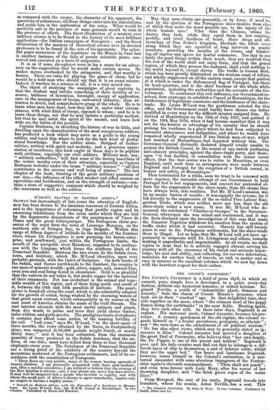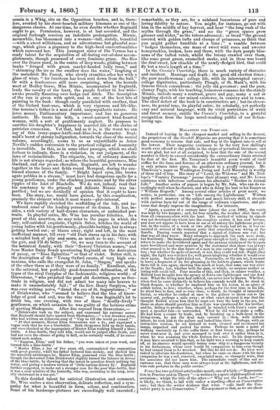THE COUSIN'S COURTSHIP.
THE Cousin's COURTSHIP is a kind of prose idyll, in which an earnest, pure, simple love is developed, in a quiet, every-day fashion, without any hysterical romance, or stilted heroism. Re- ginald Neville, a youth of "indomitable pluck, firmness and honesty," feels the charm of Cousin Minnie presence, when both are in their "rosebud" age. In that delightful time, they ride together on the moor, where "the crimson bowl of the poppy flames along the earthbaas " in the near fields. Meeting again, they love each other still. In these later days, Reginald is an orphan. His maternal uncle, Colonel Ancaster, becomes his pro- tector. A country gentleman of the old regime, the colonel re- gards himself as "a feudal providence, geologists, as atheists " ; and "the corn-laws as the embodiment of all political wisdom." "He has also other views, which may be generally stated as ig- norance is bliss." Colonel Ancaster had married a daughter of the great Earl of Pearmaine' who believes that "her own family:, the De .Pippin, is one of the purest and noblest." Reginald is poor, and his lady-cousins soon find out that he belongs to a dif- ferent layer of clay to themselves, a sort of inferior oolite, whilst they are the upper bed." Our brave and handsome Reginald, however, raises himself in the Colonel's estimation in a noc- turnal encounter with some atrocious impugners of estimation, Fenton- shire squire's eleventh commandment. "Thou shalt not poach" ; and even wins favour with Lady. Mary, after his rescue of her drowning daughter, mid "the thick green ropes of the water lilies."
From Merepool, the seat of his uncle, Reginald travels into Ironshire, where his cousin, Aston Neville, has a seat. This
• The Cousin's courtship. By John R. Wise. In two volumes. Published by Smith, Elder and Co. cousin is a Whig, sits on the Opposition benches, and is, there- fore, avoided by his stout-hearted military kinsman as one of the dangerous classes. At one time, he even doubts whether Reginald ought to go. Permission, however, is at last accorded, and the original furlough receives an indefinite prolongation. Minnie, meanwhile, has blossomed into a woman—tall, stately, beautiful —with a sweet wilfulness, and an adventurous but graceful cou- rage which gives a piquancy to the high-bred conventionalities which surround her. This youngest sister of Die Vernon has a ready talent for the acquisition of all daring out-of-door accom- plishments, though possessed of every feminine grace. She flies over the frozen pond, in the centre of deep woods, gliding between banks "fringed with green scarlet-headed holly trees," and "skimming the ice as the swallow does the water,' laughing at the maladroit Mr. Parrot, who slowly stumbles after her with a glass of wine, " for luncheon has been sent down from the hall." Or with a fearlessness still more surprising, when the hounds meet at Medley Gorse Miss Minnie, accompanied by Reginald, leads the cavalry of die hunt, the purple feather in her wide- awake proudly flaunting over hedge and. ditch. The description of the run is given with spirit, and is one of the best bits of painting in the book : though easily paralleled with another, that of the Oxford boat-race, which is very vigorous and life-like. Our heroine's father is a man of cold, unsympathetic nature. He loves money, Parliamentary importance, and has no generous instincts. He treats his wife, a sweet-natured kind-hearted woman, with a sort of gentlemanly neglect. He proposes to sacrifice his daughter's happiness in married life at the shrine of patrician connexion. Yet that, bad as it is, is the worst we can say of this ivory-paper-knife-and-blue-book character. Regi- nald's burst of stormy indignation, towards the close of the second volume, accordingly, seems to us as unjustifiable as Aston Neville's sudden conversion to the practical religion of humanity is incredible. In this, as in some other passages, which we shall forbear to indicate, there is a violation, in our judgment, of the laws of verisimilitude. The etiquette, too, of ordinary domestic life is not always regarded; as where the beautiful governess, Miss Garland, and our preux-chevalier, Reginald, are left to wander together in the lanes and fields round Merepool, during the con- tinued absence of the family. "Bright hazel eyes, like brown agate pebbles in a stream,' must have had dangerous spells for a young gentleman, under the climbing jessamine and by the silver ripples of the Islet of Bluebells. We do not, indeed-, read that his constancy to the princely and delicate Minnie was im- perilled; but we are decidedly of opinion that it ought to have been. The story, too, would have gained, by this complication, precisely the element which it most wants—plot-interest. We have rapidly sketched the scaffolding of the tale, and in- troduced some of the leading persons of its drama. It has, be- sides, a rich variety of half-drawn characters, or unfinished por- traits. In playful satire, Mr. Wise has peculiar felicities. As a proof of this assertion, we may refer to the pages in which the lazy, self-satisfied exquisite, Captain Saber, witches the world of young ladies with his gentlemanly, plausible batting, but is always getting bowled out ; or blazes away, right and left, in the most ineffectual manner, till even "old Dash stares up in his face, with a mingled look of pity and scorn, as much as to say, Give me the gun, and I'll do better." Or, we may turn to the account of the botanical family, with their "flowery Christian names," and hear Master Daisy Beach questioning Reginald on the derivation of pansy, or "Rosa Eglantine" or that of violet. Better still, is the description of the "Young Oxford curate, of very, high con- nexions, who calls the evangelist St. John, " Singon,", and speaks of the other three as if they Were of no family." Excellent, also, is the satirical, but perfectly good-humoured. delineation, of the types of the rival Coryphie of the fashionable, religious world ; of Gravestone, "who preaohed the good old doctrines, gave us free- trade in religion, and did not admit too many into heaven to make it uncomfortably full ; " of the Rev. Henry Surplyee, who was ever writing notes, "dated the eve of St. Sugarplumes ; " or of Drinkwater, who "seemed to believe that the tree of know- ledge of good and evil, was the vine." It was Reginald's lot to drink tea, one evening, with two of these " deadly-lively " gentlemen, on which occasion he was guilty of the heinous crime of quoting Shakspeare. After due reproof from Gravestone,— ' Drinkwater took up the subject, and expressed his extreme sorrow that Reginald should have quoted from Shalispeare,—' a low drunken actor, who had written an infamous song of "Cup us till the world go round."'
"At that moment, Master Elias Gravestone saw a fly, and expressed a vague wish that he was a bluebottle. Both clergymen held up their hands, and were shocked at the impropriety of Master Elias wishing himself a blue- bottle. A blue-bottle, they told him, would not be judged after death, and had not even the chance of going to hell, as he certainly would, if he enter- tained such wishes.
"'Suppose, Elias,' said his father, 'you were taken at your word, and turned into a blue-bottle .'
"Master Elias, a boy of five years old, contemplated the supposition with great gravity, while his father lectured him sternly, and showed him the manifold advantages he, Master MSS, possessed over the blue-bottle ; though the Reverend John Drinkwater slightly turned the balance in favour of the blue-bottle, by showing that the insect in question drank nothing but
water, and giving a modern version of little curious thirsty fly.' Reginald farther suggested, to make out a stronger case for the poor blue-bottle, that it was a near relative of the butterfly, who was, according to the song, actu- ally christened in a tea-pot."
To this decided talent for satirical illustration and comment, Mr. Wise unites a nice observation, delicate reflection, and a sym- pathy for what is beautiful in form, colour, and combination. Some of his landscape-pictures are exceedingly well executed ; remarkable, as they are, for a subdued luxuriance of pure and loving fidelity to nature. You might, for instance, go out with him in the middle of hay harvest, and hear "the long rush of the scythe through the grass," and see the "green spaces grow greener and wider," as the rakers advanced ; or tread "the ground. covered with golden tufts and clumps of primroses, so flick that you might gather handfuls at a time ; " a ramble between "hedges themselves, one mass of sweet wild roses and sweeter honeysuckles, broken, here and there, with the dark purple blos- soms of the tufted vetch, whilst the briony crawled over them, like some great green, enamelled snake, and in these was heard the first'sweet, low chuckle of the newly-fledged bird, that could fly but a tree's length at a time."
In the Cousin's Courtship, there is much variety of character and incident. Marriage and death ; the good old election times ; the poor needlewoman ; college life, with its interrupted career ; college dignitaries, particularly Plough, of St. Mark's, with his famous Greek conundrum ; the jolly old governor ; and the poor, clumsy Pogis, with his touching, humorous romance for the stately Minnie, include many a contrast, grave and gay, many a sad or laughing sketch of our mixed existence, in country and in town. The chief defect of the book is in constructive art ; but its clever- ness, its genial tone, its playful satire, its scholarly, yet perfectly easy and natural language, with its vivid portraiture of water and forest scenery, entitle the Cousin's Courtship, to a grateful recognition from the large novel-reading public of our fiction- loving age.



























 Previous page
Previous page